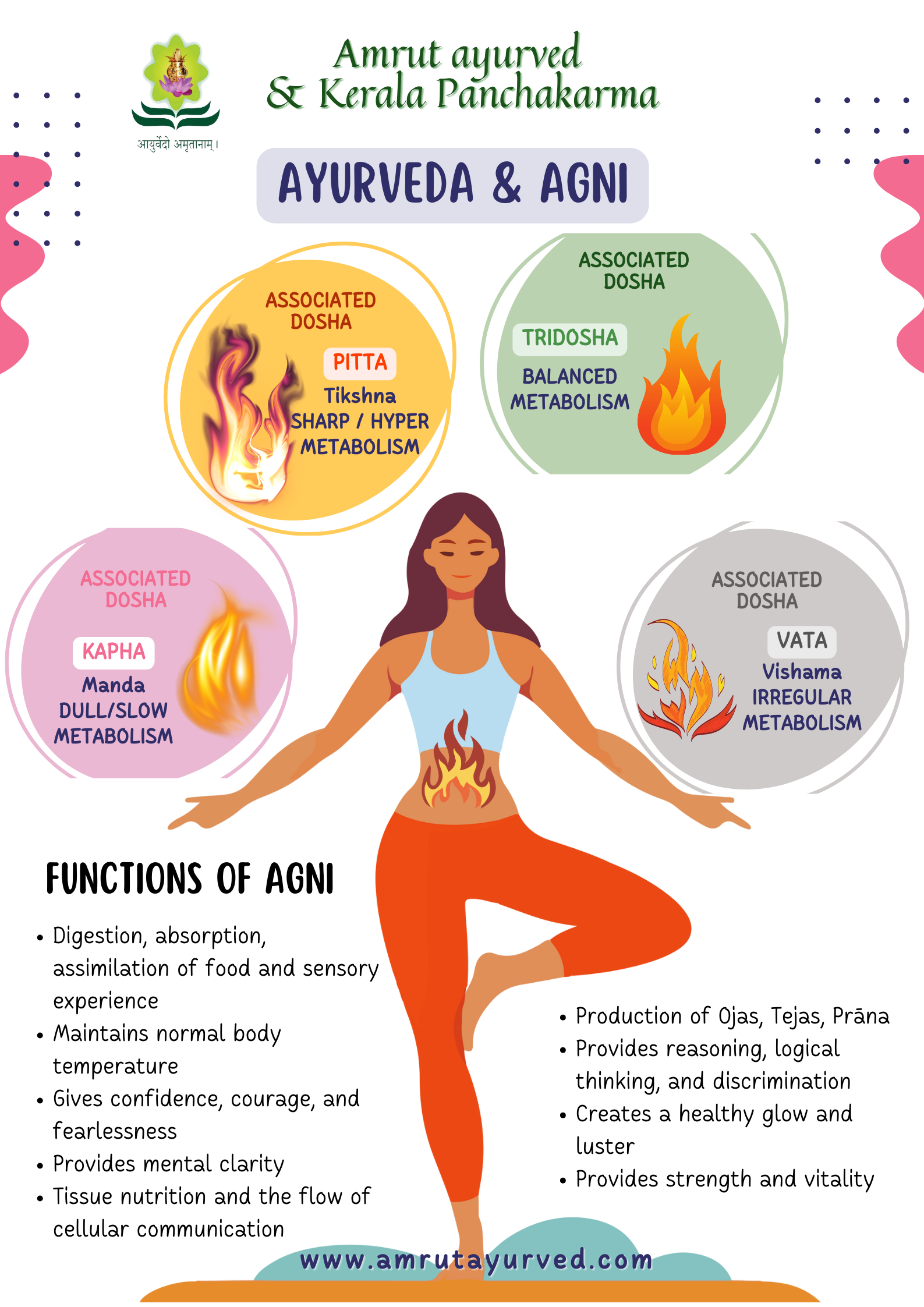
2025-02-27T18:44:36
Agni: The Fire of Life in Ayurveda In Ayurveda, Agni (digestive fire) is revered as the cornerstone of health and well-being. Derived from the Sanskrit root "Ag" meaning to move or ignite, Agni signifies the transformative energy that governs digestion, metabolism, and assimilation of food and life experiences. This vital concept is beautifully summarized in Ayurvedic texts, emphasizing that balanced Agni ensures good health, while impaired Agni leads to disease. "मितं चाति मितं चैव, भुक्तं यदनुलिप्तम। अग्नि: सन्तर्पणं यत्र, तत्र रोगाः न जायते॥" (Charaka Samhita, Sutrasthana 6.15) "Moderate, wholesome food consumed with due care kindles the digestive fire, ensuring health and warding off disease." The Essence of Agni Agni in Ayurveda is more than physical digestion—it encompasses all metabolic processes, including mental and emotional assimilation. It governs the transformation of food into energy, nutrients, and consciousness. Ayurveda identifies 13 types of Agni: Jatharagni: Central digestive fire located in the stomach and duodenum. Bhootagni: Governs the digestion of elemental components in food (Earth, Water, Fire, Air, and Ether). Dhatu Agni: Responsible for metabolism at the tissue level. Among these, Jatharagni is paramount, as it influences all other types of Agni. Types of Agni Based on Dosha Ayurveda categorizes Agni into four states, influenced by the balance or imbalance of Doshas: Sama Agni (Balanced Fire): Optimal digestion and health. Vishama Agni (Irregular Fire): Associated with Vata imbalance, causing unpredictable digestion. Tikshna Agni (Intense Fire): Linked to Pitta imbalance, leading to hyperacidity and rapid metabolism. Manda Agni (Weak Fire): Caused by Kapha imbalance, resulting in slow digestion and lethargy. Imbalance of Agni: The Root of Disease Ayurvedic philosophy asserts that impaired Agni leads to the formation of Ama (toxins), the root cause of most diseases. Ama accumulates in the digestive tract, obstructing channels (Srotas) and disrupting Dosha balance. Conditions like indigestion, bloating, joint pain, and even chronic diseases stem from Ama. Restoring Agni Through Ayurveda 1. Dietary Measures Consuming warm, fresh, and easily digestible foods. Avoiding incompatible food combinations like milk and fish. Incorporating spices like ginger, cumin, and black pepper to stimulate Agni. 2. Lifestyle Practices Eating meals at regular intervals to maintain digestive rhythm. Avoiding overeating and emotional eating. Practicing mindfulness to enhance the digestive process. 3. Ayurvedic Remedies Herbal formulations like Triphala and Hingwashtak Churna help balance Agni. Panchakarma therapies, such as Vamana (emesis) and Virechana (purgation), detoxify the digestive system. Agni and Spiritual Growth Ayurveda also correlates Agni with inner transformation and spiritual growth. When Agni is balanced, the mind becomes clear, and one experiences harmony and vitality. This state is described as Ojas, the essence of life force and immunity. Conclusion Agni is the divine flame within, nurturing both body and mind. Understanding and maintaining Agni is vital for achieving holistic health and preventing disease. Ayurveda offers timeless wisdom to kindle this fire through proper diet, lifestyle, and therapies, enabling one to lead a balanced and fulfilling life.
